European elections: Dodds, Anderson and Long elected
- Published
- comments
Watch Diane Dodds, Martina Anderson and Naomi Long react to their victories
Northern Ireland's voters are "sick of stale politics", the Alliance Party leader has said, after her party swept to success in the European elections.
Naomi Long secured the cross-community party's best ever result after taking the second of the region's three seats.
Incumbent MEPs Diane Dodds of the Democratic Unionist Party and Sinn Féin's Martina Anderson took the other two seats.
It is the first time NI has selected an all-female European Parliament line-up.
Taoiseach (Irish Prime Minister) Leo Varadkar hailed Mrs Long's victory as a historic, pro-European vote which would be "heard across the continent".
Mr Varadkar is travelling to Brussels later on Tuesday for meetings with other EU leaders to discuss the outcome of the elections and start the nomination process for the heads of the EU institutions.
'Anger and frustration'
The pro-Remain Alliance Party is not aligned to Northern Ireland's traditional Catholic or Protestant voting blocs, and its success comes after a strong performance in this month's council elections.
There was EU election joy for Alliance's Naomi Long
Mrs Long collected 170,370 votes - 115,000 more than her party received in the 2014 European election.
Alliance's sister party in Great Britain, the Liberal Democrats, also made huge gains across the UK in the European elections.
Mrs Dodds of the pro-Brexit DUP was elected on the third count, while Ms Anderson of pro-EU Sinn Féin secured her seat on the fifth count.
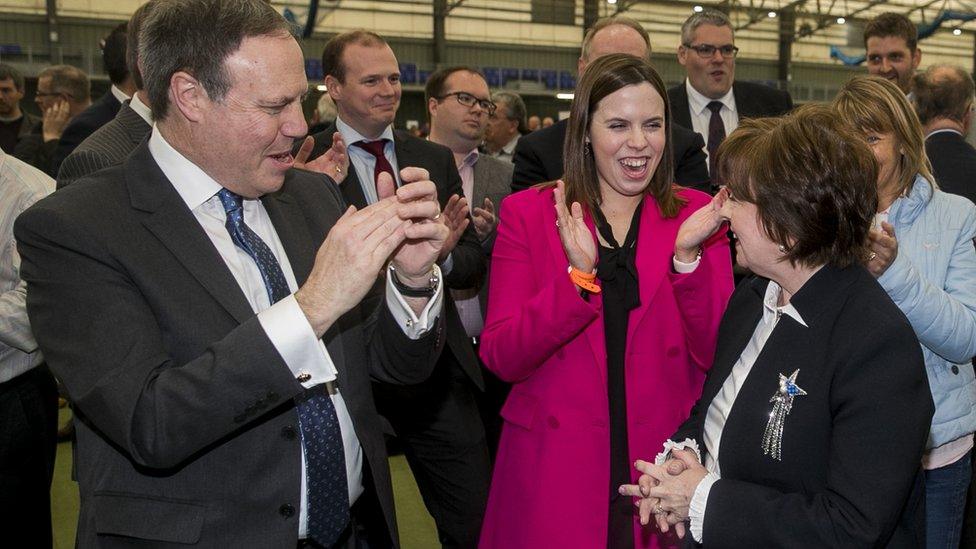
Diane Dodds, right, was applauded by her husband Nigel Dodds and their daughter Robyn
Speaking about the significance of her win, Mrs Long said her party rejected "unionist and nationalist boxes".
Her voice cracked with emotion as she thanked those who had elected her, saying they had sent a clear message that they wanted to remain in the EU.
"People are tired of the fact that the stale politics of the past isn't delivering," she said. "What we are offering for people are solutions to the problems we have, not just more problems.
"The people who voted for me came together from right across the community, regardless of unionism, regardless of nationalism, regardless of all those labels.
"I will serve them to the absolute best of my ability - they have my word on that."

Analysis: Mark Devenport, BBC News NI political editor
The traditional unionist-nationalist divide in Northern Ireland politics still exists. However, it has been overlaid by the more recent division between Leave and Remain.
The impact of having two remainers representing Northern Ireland as MEPs will depend on how long the elected members hold their seats and what transpires over the next few months in London and Brussels.
The election of two politicians determined to use their speaking time in Brussels and Strasbourg to back the Irish border backstop could provide a counter to the message the DUP conveys at Westminster.
Perhaps their narrative will pave the way towards a rethink - either via another referendum or a fresh election.
Alternatively, the Alliance breakthrough could be completely overshadowed by the triumph of Nigel Farage's Brexit Party.

Eleven candidates were competing to become one of Northern Ireland's three members of the European Parliament (MEPs) in Brussels and Strasbourg.
The threshold to win election was 143,112 votes. Mrs Dodds, who secured her place after the third count, won a total of 155,422 votes, while Mrs Long and Ms Anderson were voted in on the fifth count.
Ms Anderson won a total of 152,436 votes.
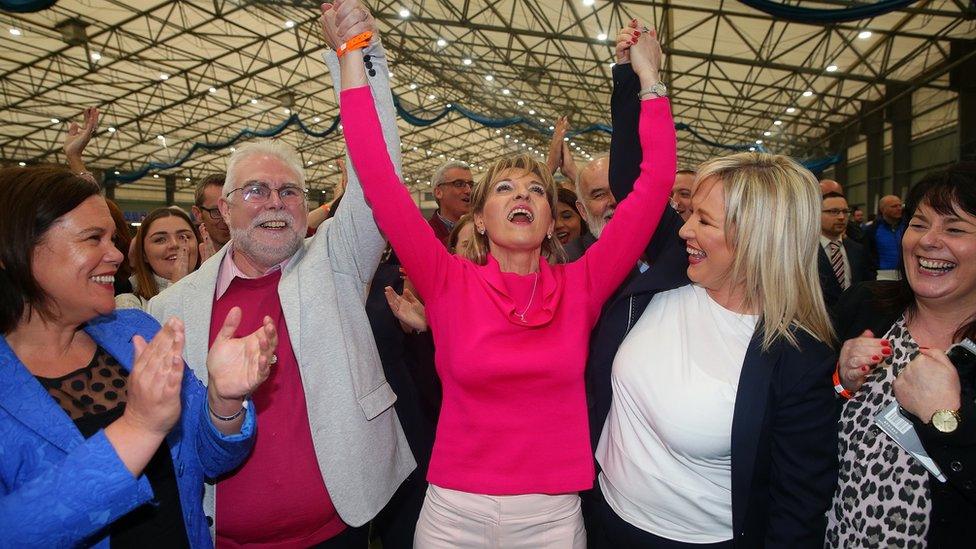
Martina Anderson received the most first-preference votes
Speaking after her election, Mrs Dodds said: "There's a lot of anger and frustration among those people who voted in the 2016 referendum that their voice has not been heard and the political class has not been heard.
"So we need to get on and deliver Brexit, one that is good for Northern Ireland."
The Ulster Unionist Party (UUP) lost the European Parliament seat it had held since 1979 after its support plummeted by more than 30,000 votes on the total it received in 2014.
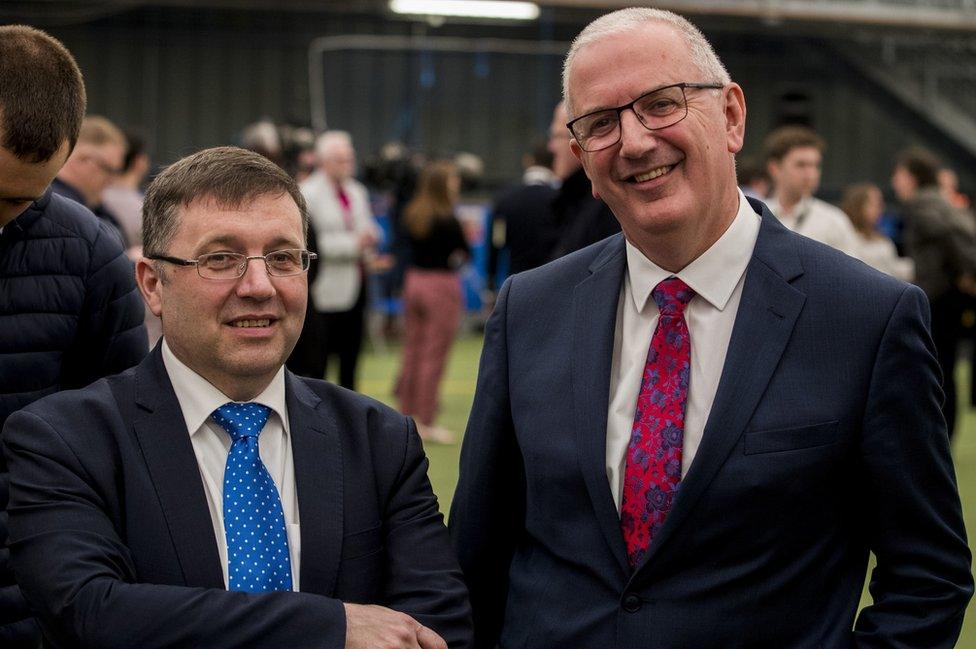
UUP leader Robin Swann (left) admitted disappointment after Danny Kennedy was eliminated
It limped in sixth in the first round, behind the leader of the Traditional Unionist Voice party Jim Allister, who accumulated a total of 90,079 votes over the five counts.
Its candidate Danny Kennedy was eliminated after the second stage of counting, with party leader Robin Swann admitting it was a "disappointing" day.

TUV leader Jim Allister, who came in fifth place, marks down results during the declaration
Ms Anderson lost almost 33,000 first-preference votes for Sinn Féin - she polled just under 160,000 in 2014 - but said she was happy with her result, putting her drop down to tactical voting by her supporters.
"Primarily, the strategy has about getting two Remainers over the line," said the anti-Brexit politician.

Staff at the count centre in Magherafelt finished much earlier than expected
"I've had republicans coming up to me and telling me: 'Look, you're safe and therefore we're going to vote tactically."
She added: "We wanted to send a message back to the EU by, in the first instance, topping the poll and, more importantly, sending two Remainers back.
"Fifty seven per cent of the people who voted here voted to remain in the EU and they have sent a strong message back to Europe that they want to stay in the EU."
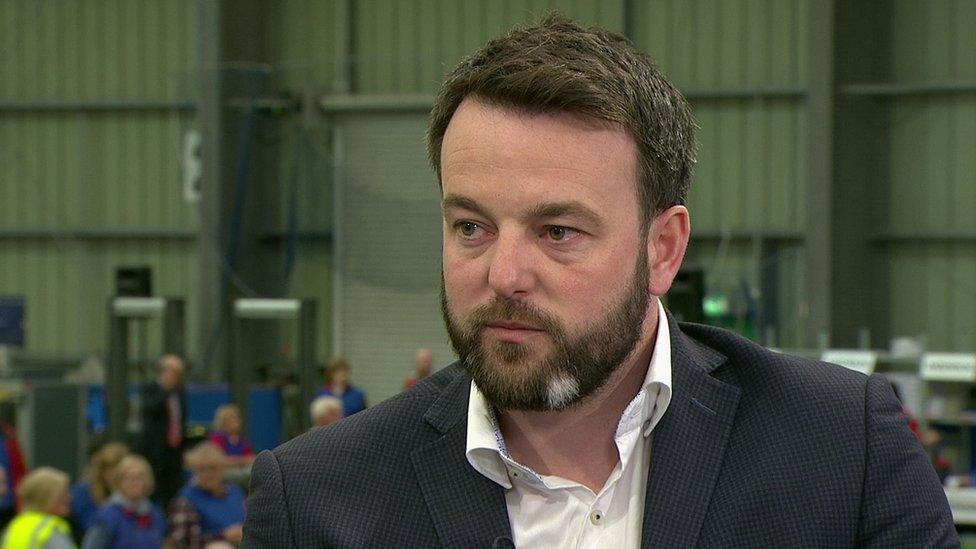
The SDLP's Colum Eastwood had a disappointing day
SDLP leader Colum Eastwood was eliminated after the fourth stage of counting.
Northern Ireland's turnout was 45% of the 1,278,951 people eligible to take part - down 7% on the 2014 election.
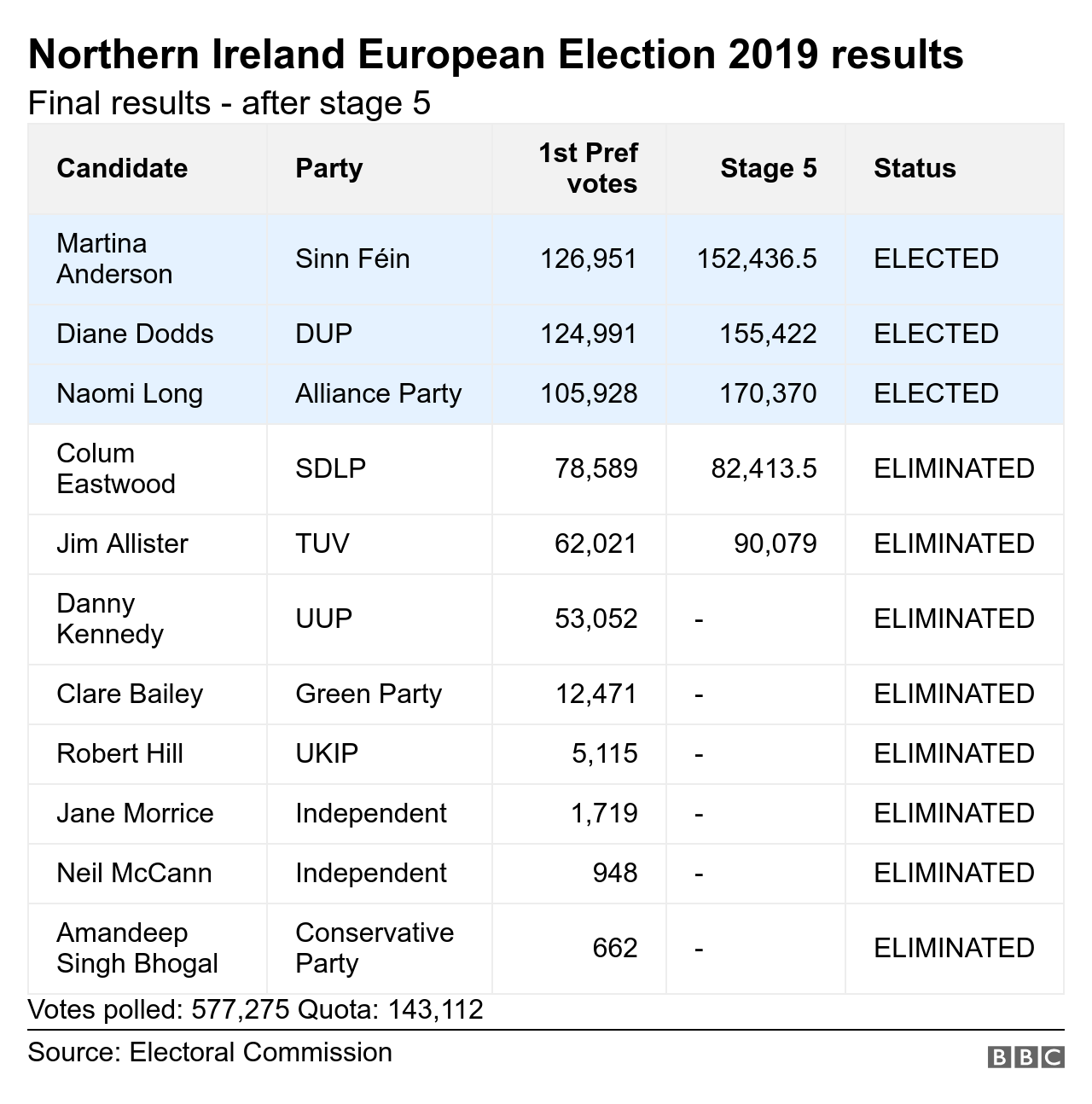
- Published27 May 2019
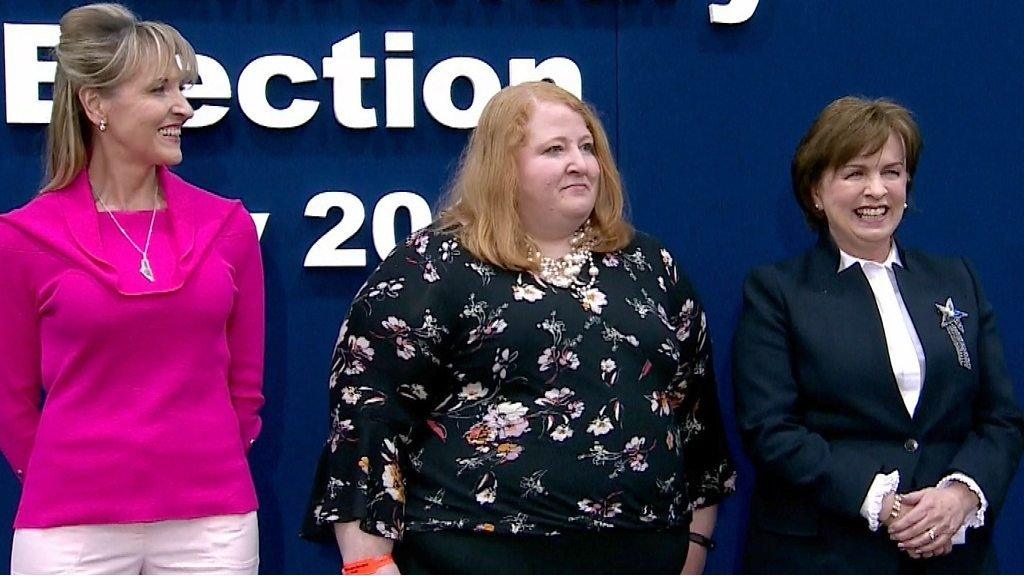
- Published27 May 2019
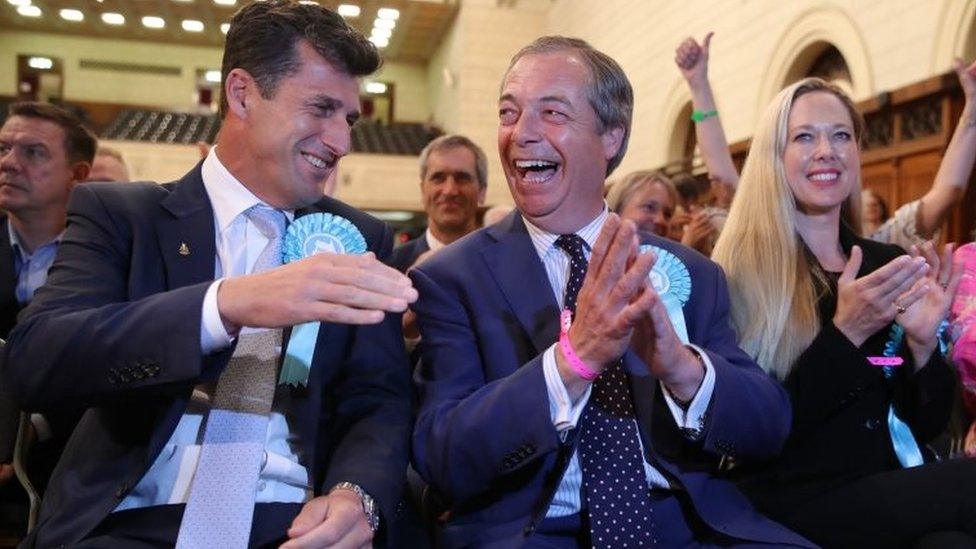
- Published11 April 2019
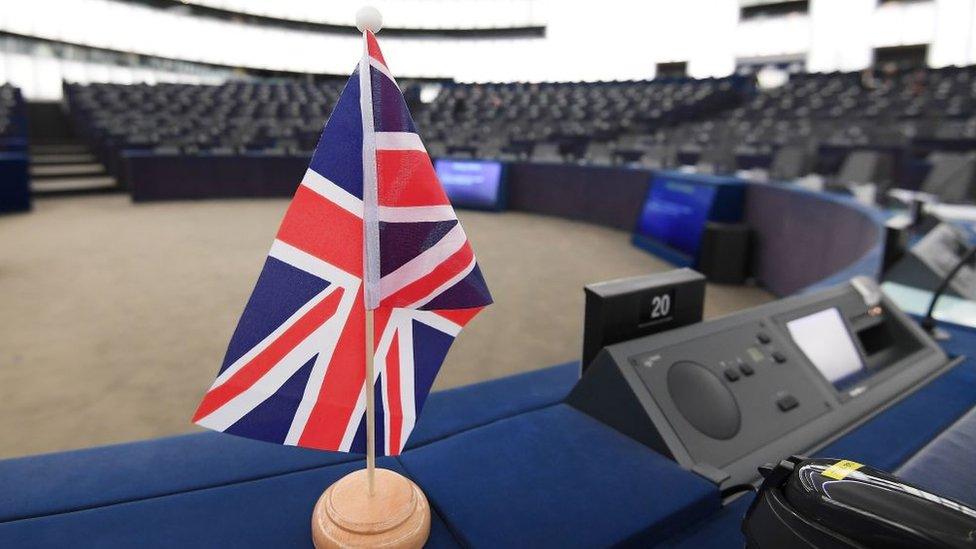
- Published7 May 2019
